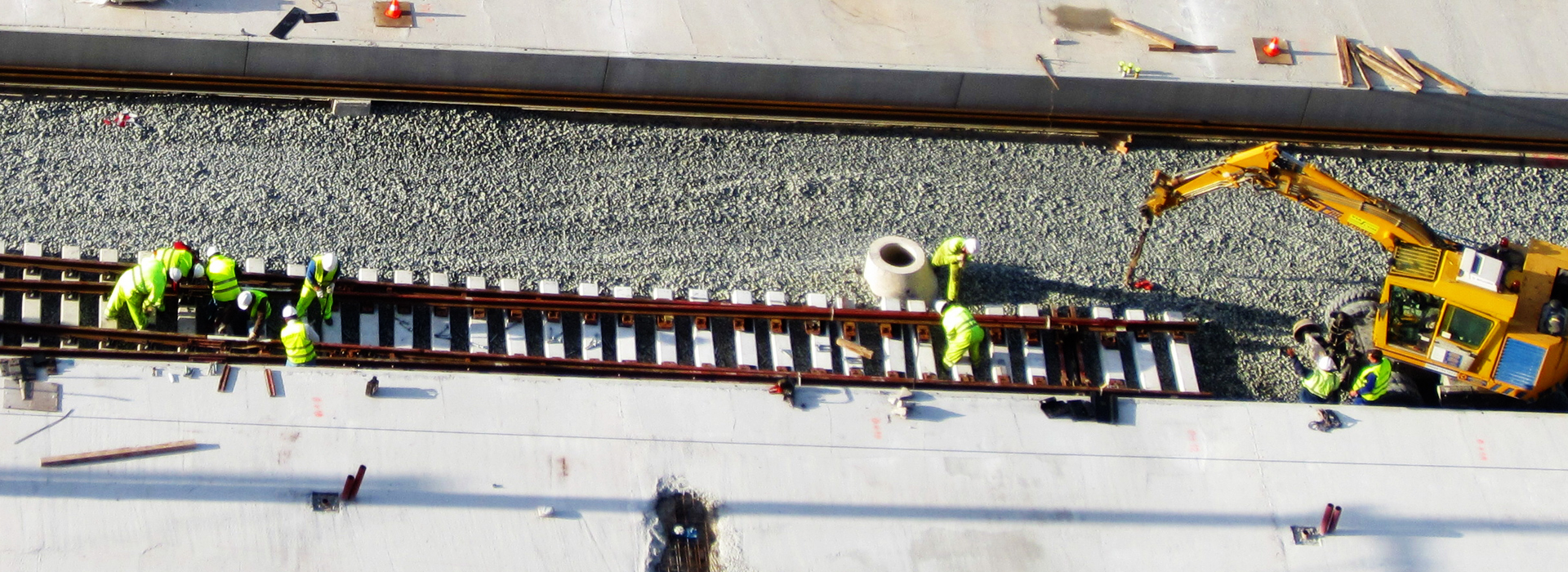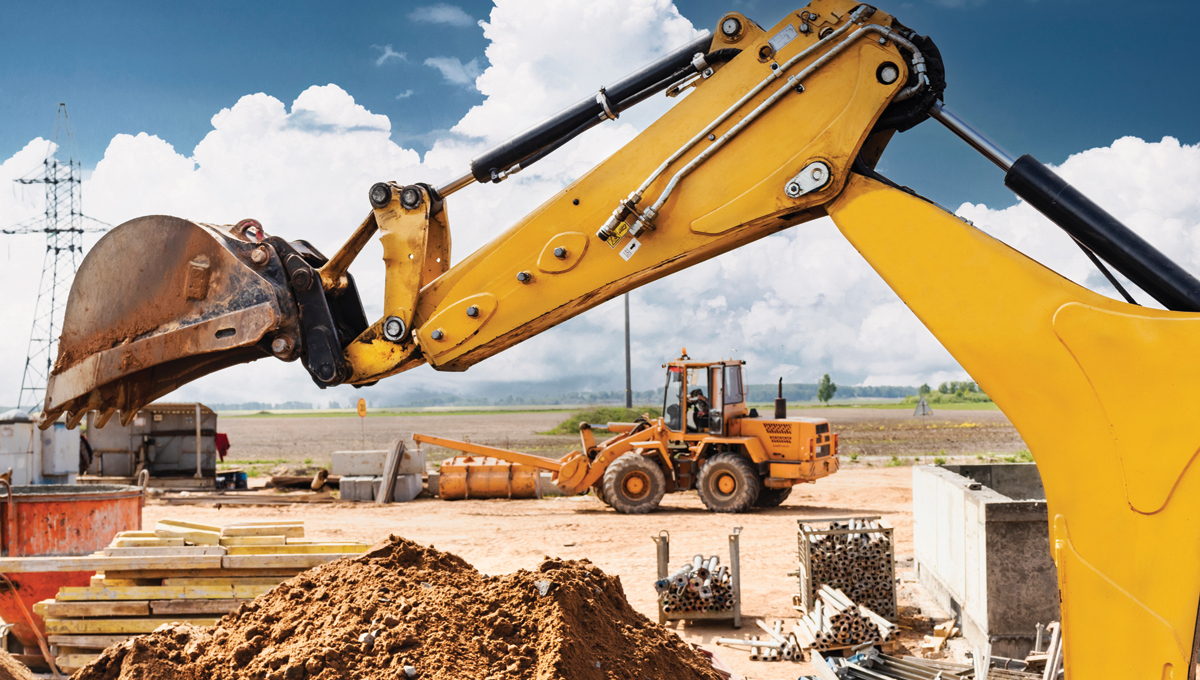Ferrovial
Ferrovial solves scalability and coordinated development of innovative technological safety solutions by developing a new cross-sectional entity with the support of dss+.

Ferrovial & dss+ Establish SafetyLab - An Engine for Innovation
With over 92,000 employees worldwide, worker safety at an international level is one of the major concerns for Ferrovial, one of the world’s leading infrastructure development groups headquartered in Madrid. In the last few years, the company has made the development of new technologies designed to reduce the number of work-related accidents a priority, embarking on a number of projects that apply the use of robotic solutions, wearables or even drones, and digital security fields to delivering risk-free working environments.
However, the biggest problem these initiatives have encountered has been their scalability. An insurmountable obstacle that, according to Valentín Alfaya, Ferrovial Corporate Director of Prevention, Quality, and the Environment, is a common stumbling block that stops pilot projects from making the leap to industrial scale.
“Scalability is what allows us to lower the price of newly developed innovations enough to start mass production,” he explains. It is critical for solutions to be suitable for use by as much of the company's large workforce as possible. If they are, the resulting benefits for the safety of the company’s own employees are conspicuous. As Mr. Alfaya says, “the impact in terms of accident rates is noticeable when initiatives are implemented on a mass scale”.
Ferrovial considers safety and health to be key factors for achieving operational excellence. The group, therefore, pursues a “Target Zero” objective which means the company proactively sets out to “create risk-free working environments for everyone, every day”. Senior management firmly believes that all accidents are preventable, a goal to which all employees of Ferrovial are fully committed. In 2016 Ferrovial began working with operational and safety management consultancy dss+ on developing a global safety and occupational healthcare program for its four business units – airports, motorways, construction, and services – that would take it closer to reaching its aim. The roadmap Ferrovial created together with the consulting firm carries through to 2020 and has already proven to be a clear success, reducing the company’s accident rate by more than 40 percent.

SafetyLab, the success of teamwork
But Ferrovial wanted to ensure that the technical innovations and other solutions planned as part of the safety and occupational health programme would be scalable and would be used in equal measure by business units and employees at different locations all around the globe. The group therefore again partnered with dss+ on developing a model that would help it achieve this aim. The concept of the SafetyLab was born in December 2018 and it was launched a few months later in February 2019. It’s clearly defined goals are to reduce the company’s workplace accidents on a global scale by implementing the foremost technological advances and best practices in innovation. Ferrovial wanted a platform that would allow the group to drive innovation of technical safety solutions and ensure their consistent and safe use both within its own organization and by potential customers. There are two key routes to accomplishing this: on the one hand, to coordinate the innovations and developments produced by each of the four business units independently; on the other hand, to promote scalability of those projects that have the greatest potential.
Project objectives
SafetyLab was born with some clearly established objectives and an essential requirement: to ensure that its activity translates into tangible safety innovation projects. The aim was to:
- Increase the number of safety innovation projects such as wearables, digital and robotic solutions.
- Become a link between corporate head office and the company’s four business units.
- Connect the business units and provide a global perspective that enables teamwork and harnesses new ideas for use in multiple directions.
- Develop activities in line with Ferrovial’s safety and innovation strategy.
- Optimize decision making, drawing on the knowledge provided by safety data acquired through the use of technology.
- Contribute to the company’s commercial objectives.
The Ferrovial group pursues a “Target Zero” objective which means the company proactively sets out to “create risk-free working environments for everyone, everyday”.
It was in this initial phase of the SafetyLab project, when its definition and start-up represented a major challenge, that Ferrovial chose to work with dss+. The rationale for the choice was clear to Mr. Alfaya: “we think of dss+ as a natural partner. One of the qualities we appreciate the most is that dss+ is way ahead of the curve, right where Ferrovial wants to be.”
dss+ was asked to assist mainly with three aspects of the SafetyLab concept:
- Validation of the model from the point of view of innovation and efficiency applied to health and safety at work.
- Development of a governance model for two departments – Innovation and Health and Safety – in each of the company’s business units.
- Definition of criteria for the inclusion of different innovation projects into the SafetyLab project pipeline.
Project definition
Since the start of 2019, Ferrovial and dss+ have together managed to accomplish all the challenges set for the first two months of the year:
- Setting up a skilled team of 20 employees from different business units, to lead SafetyLab.
- Defining the SafetyLab structure and governance process.
- Implementing tools that pinpoint areas of improvement and identify the challenges each one of the business units face, as wellas mindset and behavior challenges, focusing on:
- Technology-based, improved controls
- Research and selection of suitable technologies Definition, prioritization and selection of potential projects that can be used to carry out proofs of concept (PoC)
- Both small- and large-scale pilot projects
- Project implementation
SafetyLab functions independently as a cross-sectional corporate entity serving Ferrovial’s four business units with its own budget. It has the ability to recruit external collaborators that contribute to the scalability of the projects and produce them at an industrial scale.
An aspect that Ferrovial especially values about the collaboration with dss+ is the consulting firm’s practical and pragmatic approach. As Mr. Alfaya says, “It is a flexible and highly pragmatic international team that knows how to adapt to the reality of every situation. Something we greatly value, as, when we talk about safety at work and reducing accident rates, there is not much room for evanescent or grandiloquent proposals but rather we must have our feet well-anchored on the ground.”
Vinicius Branchini, Global Programs Manager at dss+, explains how this works in practice.
“In order to carry out the selection of the best projects for SafetyLab within each business unit,” he says, “we work with the so-called ‘strategy of prioritization and decision matrix’ which apply two key variables. On the one hand, it looks at ease of implementation and, on the other hand, it considers the expected benefits”. As a result, since its inception in February 2019, SafetyLab has already launched several projects and has started to enter into dialogue with several companies about possible collaboration on their scalability.
We think of dss+ as a natural partner. One of the qualities we appreciate the most is that dss+ is way ahead of the curve, right where Ferrovial wants to be.
VALENTÍN ALFAYA , FERROVIAL CORPORATE DIRECTOR OF PREVENTION, QUALITY & THE ENVIRONMENT
First SafetyLab innovation results
One of the initiatives in which SafetyLab is currently immersed in a wearables project for the construction sector, intended for use in access control areas that are exposed to risks from and interaction with heavy-duty machinery. The innovative technology is also designed to monitor certain critical signs of risk in confined areas.
Another noteworthy project currently underway is related to the maintenance of motorways. Mr. Alfaya says, “Although road maintenance does not have a high accident rate, it is true that, when an accident occurs, it is usually severe or even lethal, as the speed of vehicles on the motorways tends to be very high and reaction time must therefore be very short”. To address this problem, SafetyLab has developed a number of bracelets that work on an internal Wifi area and are capable of detecting the presence of vehicles long before they approach the maintenance work area. These devices measure the speed of the approaching vehicle as well as its trajectory, sending vibrations to the bracelets that will alert operators of possible risk and thus enable them to move to safety in plenty of time.
These are just a couple of examples of the specific innovation and effectiveness of the SafetyLab project.